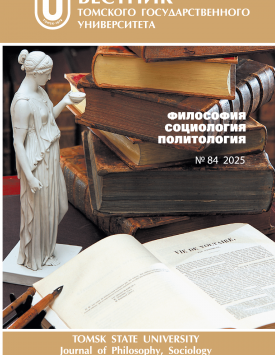Beyond material grievances: analyzing the 2015 bangladesh “No VAT on Education” movement through a New Social Movement perspective
–Ý–∞—Å—Å–º–∞—Ç—Ä–∏–≤–∞–µ—Ç—Å—è –±–∞–Ω–≥–ª–∞–¥–µ—à—Å–∫–æ–µ —Å—Ç—É–¥–µ–Ω—á–µ—Å–∫–æ–µ –¥–≤–∏–∂–µ–Ω–∏–µ 2015 –≥. –ø—Ä–æ—Ç–∏–≤ –ø—Ä–µ–¥–ª–∞–≥–∞–µ–º–æ–≥–æ –Ω–∞–ª–æ–≥–∞ –Ω–∞ –¥–æ–±–∞–≤–ª–µ–Ω–Ω—É—é —Å—Ç–æ–∏–º–æ—Å—Ç—å –Ω–∞ –æ–±—É—á–µ–Ω–∏–µ –≤ —á–∞—Å—Ç–Ω—ã—Ö —É–Ω–∏–≤–µ—Ä—Å–∏—Ç–µ—Ç–∞—Ö –≤ –æ–±—â–µ—Å—Ç–≤–µ–Ω–Ω–æ–º —Å–æ–∑–Ω–∞–Ω–∏–∏ –∫–∞–∫ –±–æ—Ä—å–±–∞ —Å —ç–∫–æ–Ω–æ–º–∏—á–µ—Å–∫–æ–π –ø–æ–ª–∏—Ç–∏–∫–æ–π, —É–≥—Ä–æ–∂–∞—é—â–µ–π –¥–æ—Å—Ç—É–ø—É –∫ –æ–±—Ä–∞–∑–æ–≤–∞–Ω–∏—é. –î–∞–Ω–Ω–æ–µ –¥–≤–∏–∂–µ–Ω–∏–µ –ø–µ—Ä–µ–æ—Å–º—ã—Å–ª–∏–≤–∞–µ—Ç—Å—è —Å –ø–æ–º–æ—â—å—é —Ç–µ–æ—Ä–∏–∏ –Ω–æ–≤—ã—Ö —Å–æ—Ü–∏–∞–ª—å–Ω—ã—Ö –¥–≤–∏–∂–µ–Ω–∏–π (NSM), –∫–æ—Ç–æ—Ä–∞—è –ø–æ–¥—á–µ—Ä–∫–∏–≤–∞–µ—Ç —Ñ–æ—Ä–º–∏—Ä–æ–≤–∞–Ω–∏–µ –∏–¥–µ–Ω—Ç–∏—á–Ω–æ—Å—Ç–∏, –ø–æ—Å—Ç–º–∞—Ç–µ—Ä–∏–∞–ª—å–Ω—ã–µ —Ü–µ–Ω–Ω–æ—Å—Ç–∏ –∏ –∫—É–ª—å—Ç—É—Ä–Ω–æ–µ –æ—Å–ø–∞—Ä–∏–≤–∞–Ω–∏–µ —Ç—Ä–∞–¥–∏—Ü–∏–æ–Ω–Ω–æ–≥–æ —ç–∫–æ–Ω–æ–º–∏—á–µ—Å–∫–æ–≥–æ –ø–µ—Ä–µ—Ä–∞—Å–ø—Ä–µ–¥–µ–ª–µ–Ω–∏—è. –û–ø–∏—Ä–∞—è—Å—å –Ω–∞ —Ç–µ–æ—Ä–∏—é NSM, —ç—Ç–æ—Ç –∞–Ω–∞–ª–∏–∑ –¥–µ–º–æ–Ω—Å—Ç—Ä–∏—Ä—É–µ—Ç, –∫–∞–∫ –ø—Ä–æ—Ç–µ—Å—Ç—ã –ø—Ä–µ–≤–∑–æ—à–ª–∏ —Ñ–∏–Ω–∞–Ω—Å–æ–≤—ã–µ –æ—Å–Ω–æ–≤–∞–Ω–∏—è –º–∞—Å—Å–æ–≤–æ–≥–æ –Ω–µ–¥–æ–≤–æ–ª—å—Å—Ç–≤–∞, —á—Ç–æ–±—ã —Å—Ñ–æ—Ä–º–∏—Ä–æ–≤–∞—Ç—å –∫–æ–ª–ª–µ–∫—Ç–∏–≤–Ω—É—é —Å—Ç—É–¥–µ–Ω—á–µ—Å–∫—É—é –∏–¥–µ–Ω—Ç–∏—á–Ω–æ—Å—Ç—å, –ø—Ä–æ—Ç–∏–≤–æ—Å—Ç–æ—è—Ç—å –Ω–µ–æ–ª–∏–±–µ—Ä–∞–ª—å–Ω–æ–π –∫–æ–º–º–µ—Ä—Ü–∏–∞–ª–∏–∑–∞—Ü–∏–∏ –æ–±—Ä–∞–∑–æ–≤–∞–Ω–∏—è –∏ —Ç—Ä–µ–±–æ–≤–∞—Ç—å –¥–µ–º–æ–∫—Ä–∞—Ç–∏—á–µ—Å–∫–æ–≥–æ —É—á–∞—Å—Ç–∏—è –≤ —Ä–∞–º–∫–∞—Ö –≤—Å–µ –±–æ–ª–µ–µ –∞–≤—Ç–æ—Ä–∏—Ç–∞—Ä–Ω–æ–≥–æ –ø–æ–ª–∏—Ç–∏—á–µ—Å–∫–æ–≥–æ –∫–æ–Ω—Ç–µ–∫—Å—Ç–∞ –ë–∞–Ω–≥–ª–∞–¥–µ—à. –ê–≤—Ç–æ—Ä –∑–∞—è–≤–ª—è–µ—Ç –æ–± –æ—Ç—Å—É—Ç—Å—Ç–≤–∏–∏ –∫–æ–Ω—Ñ–ª–∏–∫—Ç–∞ –∏–Ω—Ç–µ—Ä–µ—Å–æ–≤.
–ö–ª—é—á–µ–≤—ã–µ —Å–ª–æ–≤–∞
–∏–Ω—Ç–µ—Ä–≤—å—é,
–ø–æ—Å—Ç–∫–æ–ª–æ–Ω–∏–∞–ª–∏–∑–º,
–Ω–µ–æ–ª–∏–±–µ—Ä–∞–ª–∏–∑–º,
Движение «Нет НДС на образование» 2015,
–Ω–æ–≤—ã–µ —Å–æ—Ü–∏–∞–ª—å–Ω—ã–µ –¥–≤–∏–∂–µ–Ω–∏—è,
–ë–∞–Ω–≥–ª–∞–¥–µ—à–ê–≤—Ç–æ—Ä—ã
| Гхош Сайкот Чандра | Национальный исследовательский университет «Высшая школа экономики» | научный сотрудник, аспирант, кафедра социологии факультета социальных наук Международной лаборатории исследований социальной интеграции | saikotghosh1952@gmail.com |
–í—Å–µ–≥–æ: 1
–°—Å—ã–ª–∫–∏
Garcia, R.G. & Trere, E. (2014) The #YoSoy132 movement and the struggle for media democratization in Mexico. Convergence: The International Journal of Research into New Media Technologies. 20(4). pp. 496-510.
Cammaerts, B. (2013) The Mediation of Insurrectionary Symbolic Damage. The International Journal of Press/Politics. 18(4). pp. 525-548.
The Constitution of the People’s Republic of Bangladesh. [Online] Available from: http://bdlaws.minlaw.gov.bd/act-367.html (Accessed: 18th November 2024).
Sampedro, V. & Lobera, J. (2014) The Spanish 15-M Movement: a consensual dissent? Journal of Spanish Cultural Studies. 15(1-2). pp. 61-80.
Anjalin, U. (2020) Portrayals of Hashtag Activism in Southeast Asia: A Case Study of #NOVATONEDUCATION Citizen Movement in Bangladesh. Dr. Diss. University of Tennessee. p. 278.
Karim, E. (2015) The Power of Social Media. The Daily Star. 4th December. [Online] Available from: https://www.thedailystar.net/star-weekend/spotlight/the-power-social-media-181789 (Accessed: 18th January 2025).
Barai, M.K. (ed.) (2020) Bangladesh’s Economic and Social Progress: From a Basket Case to a Development Model. Singapore: Springer.
Jackman, D. (2021) Students, movements, and the threat to authoritarianism in Bangladesh. Contemporary South Asia. 2(29). pp. 181-197.
International Labour Organization (ILO). (2015) Global Employment Trends for Youth 2015. Geneva: ILO. [Online] Available from: https://www.ilo.org/publications/global-employment-trends-youth-2015-scaling-investments-decent-jobs-youth (Accessed: 16th January 2025).
Dhaka Tribune. (2015) 23 hurt as police foil anti-VAT EWU demo. [Online] Available from: https://www.dhakatribune.com/bangladesh/bangladesh-others/109087/23-hurt-as-police-foil-anti-vatewu-demo (Accessed: 11th February 2025).
Sobhan, R. (1993) Bangladesh: Problems of Governance. University Press.
Jahan, R. (1995) Pakistan: Failure in National Integration. Dhaka: University Press.
Baxter, C. (1991) Bangladesh in 1990: Another New Beginning? Asian Survey. 31(2). pp. 146-152.
Calhoun, C. (1993) New Social Movements of the Early Nineteenth Century. Social Science History. 17(3). pp. 385-427.
The Daily Star. (2015) Students’ demo stops Dhaka. [Online] Available from: https://www.thedailystar.net/frontpage/news/students-demo-stops-dhaka-141397 (Accessed: 10th March 2025).
Umar, B. (2004) The Emergence of Bangladesh: Class Struggles in East Pakistan, 1947-1958. Oxford: Oxford University Press.
Alam, S.M.S. (1991) Language as political articulation: East Bengal in 1952. Journal of Contemporary Asia. 4(21). pp. 469-487.
Offe, C. (2019) New Social Movements: Challenging the Boundaries of Institutional Politics (1985). In: Schmidt, A. & Weber, B. (eds) Social Movements and Political Change: Theoretical Perspectives. Wiesbaden: Springer Fachmedien Wiesbaden. pp. 255-294.
Melucci, A. (1989) Nomads of the Present: Social Movements and Individual Needs in Contemporary Society. Philadelphia: Temple University Press.
Habermas, J. (1984) The Theory of Communicative Action. Boston: Beacon Press.
Inglehart, R. (1977) The Silent Revolution: Changing Values and Political Styles Among Western Publics. Princeton: Princeton University Press.
Touraine, A. (1981) The Voice and the Eye: An Analysis of Social Movements. Cambridge [Cambridgeshire]; New York: Cambridge University Press; Paris: Maison des sciences de l’homme.
World Bank Open Data. (2015) World Bank Open Data. [Online] Available from: https://data.worldbank.org/indicator/NY.GDP.PCAP.CD?end=2015&locations=BD&most_recent_year_desc=true&start=2015 (Accessed: 10th February 2025).
The Daily Star. (2015) V for no VAT. [Online] Available from: https://www.thedailystar.net/frontpage/news/v-no-vat-143461 (Accessed: 15th March 2025).
University Grants Commission of Bangladesh. (2024) Annual Report 2023. Dhaka: University Grants Commission. [Online] Available from: https://ugc.portal.gov.bd/sites/default/files/files/ugc.portal.gov.bd/annual_reports/104b8c32_dbe2_4c07_8228_76b999beff2a/2024-01-23-05-49-e04bbf524cb5120252822612c3fab6df.pdf (Accessed: 3rd March 2025).
Ministry of Finance of the People's Republic of Bangladesh. (2015) Budget in Brief 2015-16. Dhaka: Finance Division, Ministry of Finance. [Online] Available from: https://mof.gov.bd/sites/default/files/files/mof.portal.gov.bd/page/budget_in_brief_2015_16.pdf (Accessed: 9th February 2025).
Anik, S.S.B. (2015) NBR asks private varsities to pay VAT by August 15. Dhaka Tribune. 15th August. [Online] Available from: https://www.dhakatribune.com/bangladesh/education/106385/nbr-asks-private-varsities-to-pay-vat-by-august-15 (Accessed: 6th February 2025).


 –í—ã –º–æ–∂–µ—Ç–µ –¥–æ–±–∞–≤–∏—Ç—å —Å—Ç–∞—Ç—å—é
–í—ã –º–æ–∂–µ—Ç–µ –¥–æ–±–∞–≤–∏—Ç—å —Å—Ç–∞—Ç—å—é